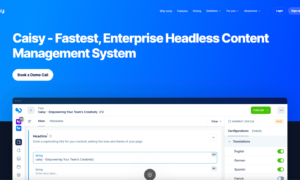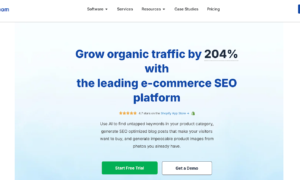Starting your own online business can be an exciting journey. You are taking your first steps into the world of entrepreneurs and probably have amazing plans and expectations for your company. And for brave icons like yourself, we have prepared a list of the best tools to make this process more manageable and accessible. Ready? Let’s get started!
Building Your Online Presence
Regardless of whether your business is e-commerce, whether you become an online copywriter or a social media specialist, you must have a website. How to create it? Well, there are a few steps.
- CMS. It’s the foundation of every successful online company. The most popular systems are probably WordPress, HubSpot CMS Hub, and Magento. Their interfaces are designed to be user-friendly, which makes building a website more intuitive for rookies like you. Tip: choose a CMS that aligns with your business needs and is easy to use.
- E-commerce platform. If you’re running an online business and selling products or services, you must be looking for an e-commerce platform that meets your unique needs. Lucky for you, Shopify, WooCommerce, and Magento are some of the best options out there. They offer secure payment gateways, inventory management, and customizable features that make the online shopping experience a breeze for your customers.
- Design and UX. When you create a website, it’s important to make it look good. Thanks to that, your visitors will stay longer on the page and be more willing to trust your professionalism. Try tools like Adobe XD, Sketch, or Figma. They can assist you in creating a prototype of your website before you start the process of development. It’s the first step in creating a user-friendly and visually appealing page.
If you haven’t created a website before, and you’re afraid you won’t be able to do it or just don’t have time, it’s best to consult your idea with a software house or design agency. You can also look for a contractor among junior designers or developers – you may find someone who’ll treat your offer as an opportunity to learn and expand their portfolio.
Unveiling the Power of Eye-Tracking in UX Design
What is a common mistake that owners of new online businesses tend to make? They trust the opinions of people who have no knowledge about UX, design, or… running an online business. Please, don’t be one of them. Sure, the opinion of your mom, wife, or friend is important, but let it be about personal matters, not the usability of your website.
- Testing on humans. That’s right. You should always test your interface on a real human being (no, not your mom. You need someone for „the outside”). To do so, use tools like Maze or UserTesting – they will help you to conduct surveys and gather useful feedback. Thanks to this, you will be able to improve any problematic elements.
- Eye-tracking. Have you heard about eye-tracking? It’s a clever tool that gives insights into users’ behavior, especially where they focus their gaze. With a device like that, you can establish which part of the page attracts the most attention. If you’re looking for a free eye tracker, RealEye might be the best solution. It works with websites, videos, and even store shelves.
Marketing Mastery for Beginners
Marketing can be a little tough at the beginning, but stay positive! There are a lot of great tools that can help transform your business into an “it” brand within weeks!
- SEO. The higher your website shows in Google results, the higher the chances for new clients! That’s why you shouldn’t skip your SEO routine. Use tools like SEMrush or Moz. They can help you optimize your page, run keyword research, and monitor your online presence. It’s super important for any online business.
- Blog. One of the most important tools you should implement in your PR and marketing strategy. Need the ideas for posts? Focus on two areas: You (your achievements, your competencies, etc.) and the brand (case studies, business trends, customer opinions, portfolio, etc.). Write a lot and share your knowledge with the world on social media. New clients want to be sure they pick someone trusted and experienced when choosing a business partner.
- Social media. If you’re running an online business, it’s super important to have a solid social media strategy as part of your marketing plan. Managing multiple platforms can be time-absorbing, but tools like Hootsuite or Buffer simplify that process. With those, you’ll be able to schedule posts, respond to DMs, and analyze all the important metrics. Also, there are plenty of online courses available that offer helpful tips and creative ideas to inspire your content creation journey.
- Email marketing. Even though you won’t have a large mailing database at the beginning of your new business, you should start to build it right away. Use a simple trick and motivate customers to sign up for your newsletter by offering them some discounts. As your subscriber base grows, make sure you mail only quality content and remember not to send it too often. What tools are best for email marketing? Try Mailchimp or Constant Contact. Both have easy to use message creators and provide reports that let you know who opened your message.
We totally get it – starting your first online business can be challenging, especially when it comes to choosing the right tools. But have no fear. There are tons of options out there, and we’re sure you’ll find the perfect solutions for your needs. Our best advice is to do some research, check out social media discussions, and chat with other business owners. These simple steps will help you build a solid foundation for your brand and set you up for success. Good luck!
Source: RealEye – “all-in-one” solution to conduct distributed eye-tracking/neuromarketing studies, and analyze the data from your web browser



































